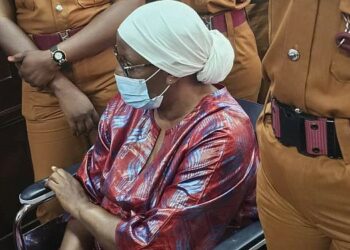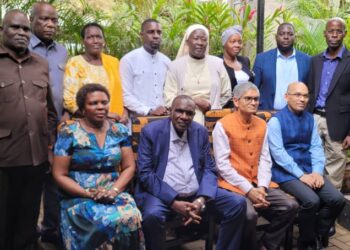The mere mention of COVID-19 sends shivers down the spines of many in Jinja City, Uganda’s second biggest city, recalling the devastating impact the pandemic had on the global community.
As can be recalled, Uganda confirmed its first COVID-19 case on 21st March,2020 of a 36-year-old male resident of Kakungulu Zone, Kibuli who had just returned from Dubai, United Arab Emirates aboard Ethiopian Airlines and was identified through routine screening at Entebbe International Airport.
While recent social media reports suggested new cases in major towns like Kampala, and Entebbe, Jinja Regional Referral Hospital administrators reassure the public that they haven’t recorded any cases from July 1 to September 30, 2025.
“…we have not had any cases of COVID-19 in the last three months, so there is no cause for alarm, but members of the public should take precautionary measures…,” says Dr. Alfred Yayi, the hospital director.
He says the hospital which caters for patients from the greater Busoga which covers Buikwe, Mukono and Kayunga districts, has tested 35 patients suspected of having the virus, but none have confirmed positive.
According to Dr. Alfred Yayi, the pandemic’s impact on Jinja was significant, with studies showing its effect on education. Research conducted by the Uganda National Examinations Board (UNEB) found that post-COVID-19 violence prevention approaches in schools significantly impacted students’ achievement.
The study highlighted the importance of school administrators working with teachers and prefects to implement rules and regulations, encouraging student leadership and dialogue to settle conflicts.
A study by the Infectious Diseases Institute (IDI) at Makerere University found that self-medication for COVID-19 was prevalent among residents in Jinja’s slums.
Self-medication refers to the practice of using medicines or substances without professional medical guidance or supervision.
This highlights the need for continued public awareness and education on COVID-19 prevention and treatment.
The World Health Organization (WHO) emphasizes that COVID-19 is still an ongoing pandemic, but various measures like vaccination, mask-wearing, social distancing, and improved healthcare have helped bring it under control.
Regular handwashing, in particular, is a universal public health practice that experts encourage at all times, not just during pandemics. Hands are the most commonly used parts of the body and are prone to infections, making frequent handwashing crucial in preventing the spread of diseases.
According to experts, handwashing is one of the simplest and most effective ways to prevent the spread of infections, and it is essential that individuals take ownership of their hand hygiene and make it a habit, without waiting for anyone else to enforce it.
Experts also stress that handwashing should be a universal practice, adopted by everyone, everywhere to reduce the risk of spreading diseases, not just COVID-19, but also other infectious diseases.
President Yoweri Museveni’s COVID-19 Measures: A Reflection of Exemplary Leadership and Prudent Caution.
President Yoweri Museveni’s adherence to COVID-19 protocols has drawn praise from his loyalists, who argue that his actions demonstrate exemplary leadership.
As a veteran military general and leader who fought a protracted people’s war, Museveni’s cautious approach is rooted in his experience and understanding of the importance of calculated decision-making.
A Leader’s Responsibility.
President Museveni’s commitment to COVID-19 protocols reflects his concern for personal health and security, recognizing that any slight mistake or recklessness can have devastating consequences.
As the leader of a nation with more than 45 million people, Museveni’s priority is the welfare of his citizens and visitors. His measures aim to prevent the spread of COVID-19, protecting the health and well-being of Ugandans and those who interact with the country.
Experts also say that by taking a cautious approach, President Museveni demonstrates prudent leadership, weighing the risks and consequences of his actions and decisions.
His military background has also instilled in him a sense of discipline and strategic thinking, which informs his response to the pandemic.
Critics, particularly opposition politicians and their supporters, claim that President Yoweri Museveni’s COVID-19 measures are no longer necessary.
However, pro-government officials have always described the opposition as obstructionists whose motive is merely criticism for the sake of the gallery.
President Museveni has been praised for his proactive approach to managing the pandemic, including implementing lockdowns and other measures to slow the spread of the virus.
What You Need To Know:
Jinja Regional Referral Hospital has emerged as a leading healthcare facility in eastern region, offering a wide range of specialized services that were previously only available at Mulago Hospital in Kampala.
As the largest hospital in the region, JRRH boasts a 600-bed capacity and serves approximately 4.5 million people across 12 districts, including neighboring Buikwe, Kayunga and Mukono.
The hospital’s impressive array of services includes general surgery, neurosurgery, pediatric surgery, urology, and operating theater services, obstetrics and gynecology offering antenatal care, maternity services, family planning, and urogynecology.
Under internal medicine there is general medicine, cardiology, pulmonology, nephrology, and infectious disease management while in the department of general pediatrics, neonatology, and pediatric surgery. Other aspects include general psychiatry and social services.
The hospital has an Intensive Care unit (ICU) with life-sustaining equipment donated by Assist International and General Electric.
Orthopedic services, including a newly commissioned 64-bed Samuel Leeds Orthopedic Ward with better equipment.
JRRH also runs emergency services, with 24-hour ambulance services, laboratory and diagnostic services, including histopathology and cytotechnology, pharmacy and dispensing services, physiotherapy and counseling services.
The hospital’s commitment to providing quality healthcare has earned it recognition as an internship center for medical students and graduates, contributing to the development of the next generation of healthcare professionals in Uganda
Do you have a story in your community or an opinion to share with us: Email us at editorial@watchdoguganda.com













